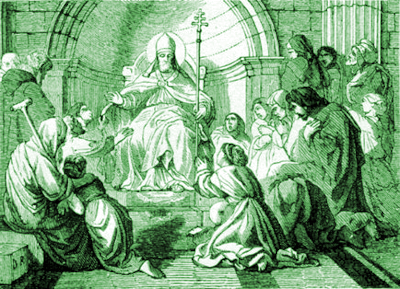Lives of the Saints
Our Models and Protectors
Spiritual Bouquet:
March 2

Saint Simplicius
Pope
(† 483)
Saint Simplicius was the ornament of the Roman clergy under Popes Saint Leo and Saint Hilarius, and succeeded the latter as Supreme Pontiff in 468. He was raised up by God to comfort and support his Church amid the greatest tribulations, occasioned by the fall of Rome in the eighth year of his reign.
All the provinces of the Western Empire outside Italy had come into the hands of barbarians. The emperors for many years were rather shadows of power than sovereigns, and, in 476 Rome, capital of the Empire, disappeared when the son of the last one having the title of emperor was deposed. All Italy, through the oppression and the ravages of the barbarians and the assassination of three emperors, was left almost a desert without inhabitants; and the Roman armies consisted chiefly of barbarians hired under the name of auxiliaries. The northern barbarians were demanding a third of the lands of Italy, and being refused, chose for their leader the intrepid Odoacre, an Arian like all the barbarian kings reigning in the provinces, and he was proclaimed king in Rome by his followers. He put to death the regent of the empire, named to govern during the minority of Augustulus, whom the senate had advanced to the imperial throne. He spared at least the life of the young sovereign, appointed him a salary of six thousand pounds of gold, and permitted him to live at liberty near Naples. This was indeed the end of the Western Empire.
Pope Simplicius was occupied with comforting and relieving the afflicted, as well as sowing the seeds of the Catholic faith among the barbarians. Like the experienced pilot he was, he guided the Church through the troubled waters of a stormy sea.
The East gave the zeal of Saint Simplicius no less employment and concern. Peter Cnapheus, a violent Eutychian heretic, was proclaimed by his followers Patriarch of Antioch, and the profligate Peter Mongus became Patriarch of Alexandria. The Patriarch of Constantinople, named Acacius, supported Mongus against the Pope and the Catholic Church. Acacius was a notorious hypocrite who often made religion serve his private interests. Saint Simplicius eventually discovered his artifices, and redoubled his zeal to maintain the holy faith, which he saw betrayed on every side. The Emperor Zenon, listening to the Pope for a time, drove out several Eutychians from their sees; but the intrigues of the heretics continued to create serious difficulties for the Father of Christianity, since the patriarchal sees of Alexandria and Antioch were occupied by men of ruse, and there was not one Catholic king in the entire world.
Saint Simplicius, after dedicating four major churches of Rome and establishing many useful regulations for the Roman Church during his reign of nearly sixteen years, went to receive the reward of his labors in 483. He was buried in Saint Peter's on the 2nd of March.
Little Pictorial Lives of the Saints, a compilation based on Butler's Lives of the Saints and other sources by John Gilmary Shea (Benziger Brothers: New York, 1894); Les Petits Bollandistes: Vies des Saints, by Msgr. Paul Guérin (Bloud et Barral: Paris, 1882), Vol. 3